The Hyperlite Mountain Gear Contour 35 is a waterproof frameless backpack designed for thru-hiking by more experienced backpackers carrying minimal gear. With 43.5L of total volume (35L internal and 6.5L external), it’s been stripped down to a minimal feature set to reduce its weight to 16.2 oz, or just a hair over one pound. It has six external pockets, so you can store the items or snacks you need during the day without opening up the main compartment. The Contour 35 also makes a nice day pack for longer hikes and peakbagging when you need to carry extra insulation or protective gear.
RELATED: 10 Best Ultralight Frameless Backpacks
Specs at a Glance
- Weight: 16.2 oz (459g) – size medium
- Gender: Men’s
- Internal Volume: 35 Liters
- External Volume: 6.5 Liters
- Pockets: Main + 6
- Load lifters: No
- Hip belt Pockets: No
- Hydration system compatible: No
- Ice Axe Loop: Yes
- Colors: White or Black
- Materials: Dyneema DCF, 100D Dyneema Gridstop, Dyeema Stretch Mesh
- Maximum recommended load: 25 lbs
- Bear Canister Compatibility: BV425 and BV450 (horizontal), BV475 and BV500 (vertical)
The Contour 35 is a backpack best suited for ultralight backpacking with up to 25 pounds of gear, food, and water. It is made of Dyneema DCF and fully seam-taped, but it is a simple roll-top backpack with few frills. It’s frameless, has a simple removable webbing strap for a hip belt, is not hydration compatible, doesn’t have a top Y strap, and there’s no back padding behind the shoulder straps, so you have to carefully pack items like bear canisters that can poke you in the back.
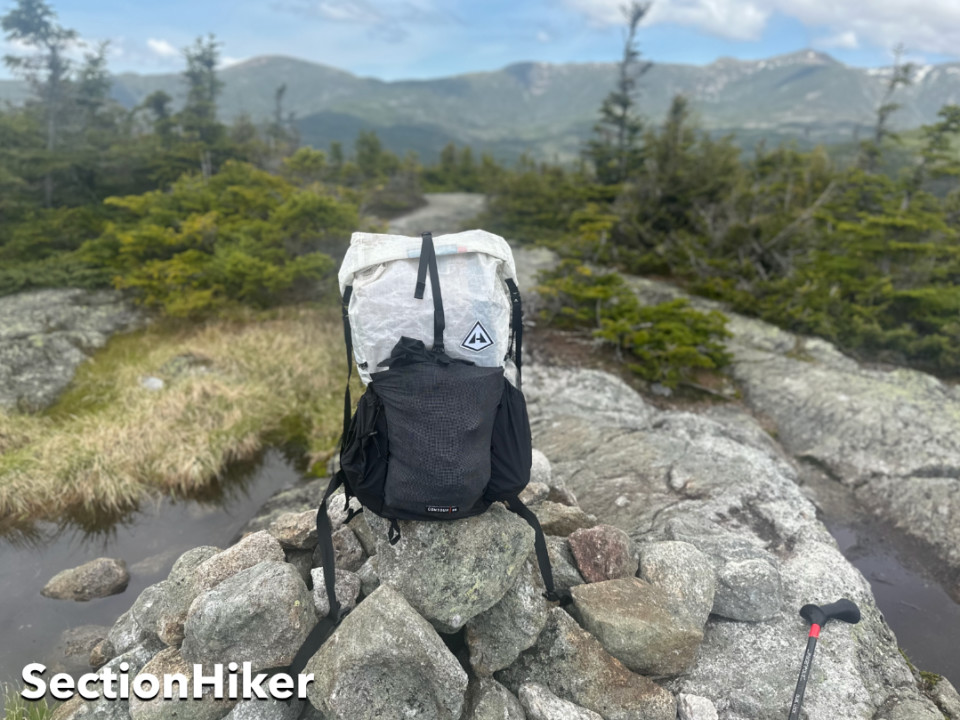
Backpack Storage and Organization
The Contour 35 has a classic roll-top that can be strapped to the sides like a dry bag or clipped together on the top. The top of the main pack bag has a stiffener to facilitate rolling instead of the Velcro closure Hyperlite used previously on their larger packs. Velcro doesn’t get along with outdoor clothing, particularly a fuzzy fleece like Polartec Alpha, so this is a welcome enhancement.
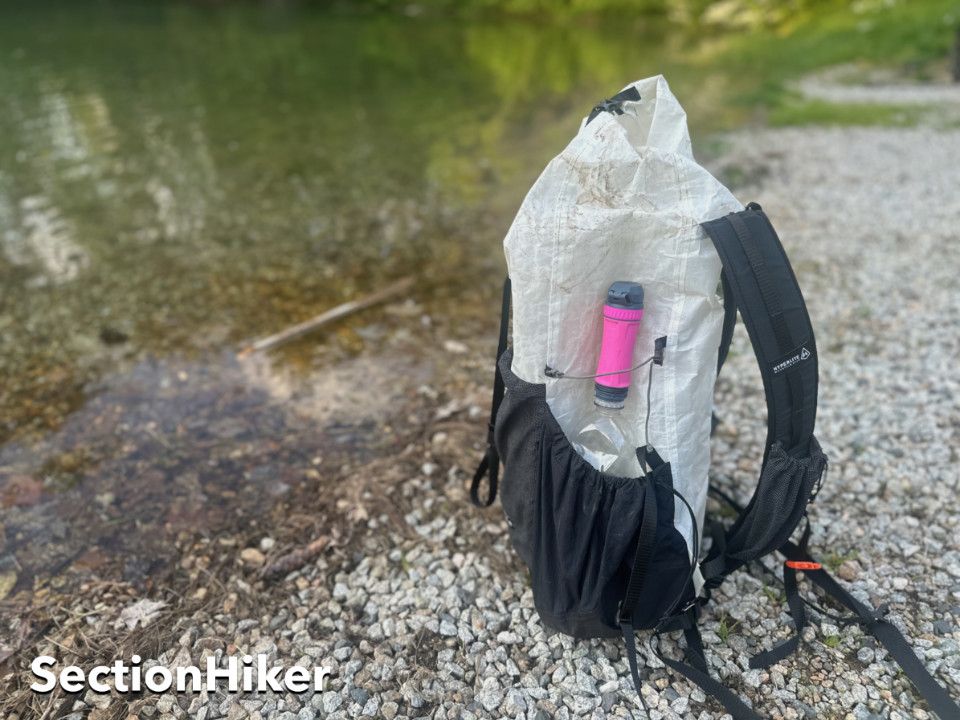
What the Contour 35 lacks in features, it makes up for in six external pockets capable of holding 6.5 liters of gear and food. There are two stretch pockets on the shoulder straps, two side pockets, a front stretch pocket, and a bottom pocket on the underside of the pack bag for holding snacks and trash. The pockets let you store everything you need during the day close at hand, so you don’t have to stop to open the main compartment and dig around to find stuff. That means you can keep walking non-stop all day, which is how serious thru-hikers crush big miles.
The side bottle pockets are deep enough to store tall bottles, like Smartwater bottles, in them, and they have a simple compression strap above them if you like to hike with your water filter attached. The side pockets are heavily reinforced at their base to withstand abrasion and have elastic shock cords at the top that you can tighten to prevent the contents from falling out. While I can reach back and pull a bottle out of the side pockets, putting it back in can be a challenge because of those elastic shock cords.
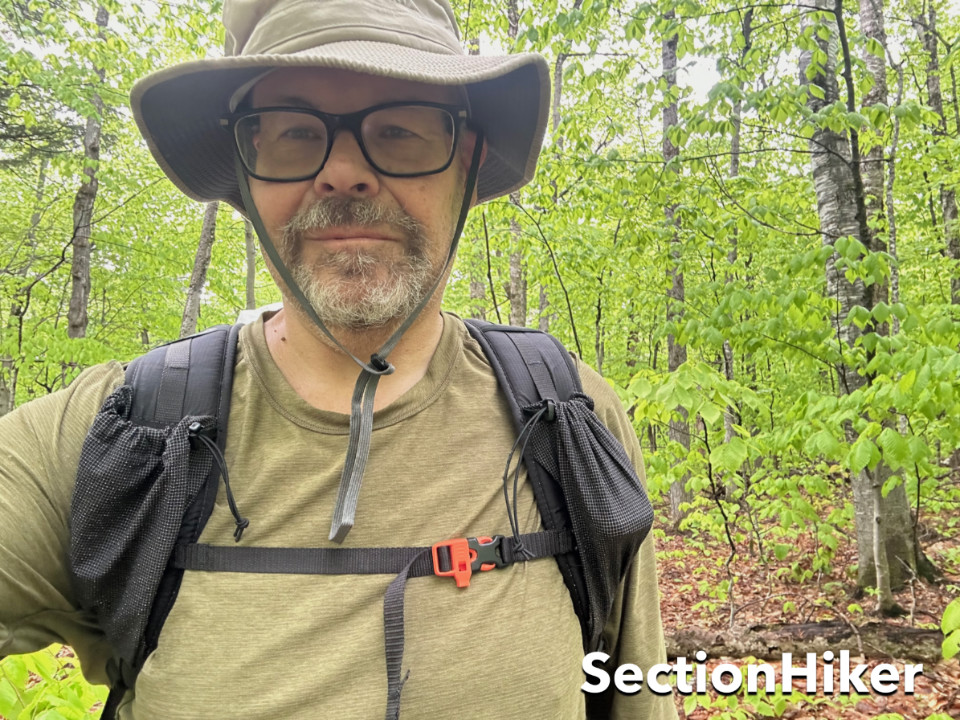
The shoulder straps have sewn-on pockets sized for holding electronics and small water bottles, up to about 20 oz. If you’d rather use different pockets, the shoulder straps have daisy chains, which can serve as anchor points. Personally, I like using the shoulder strap pockets to store my Garmin inReach Mini2 and my iPhone since they provide easy and secure access to both.
The front stretch pocket isn’t huge, but it’s big enough to store a lightweight shell or wind shirt, a wet water filter and reservoir, or a day’s worth of food. It’s made with a durable Dyneema Stretch mesh and has a buckle on top that connects to the pack’s top strap to keep contents secure.
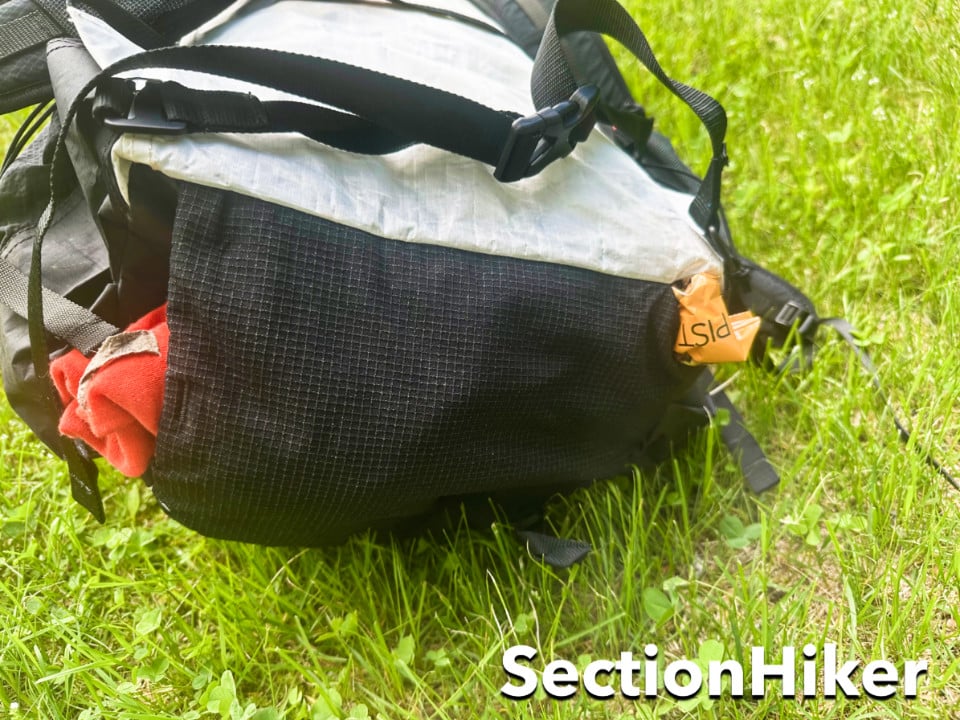
The Dyneema Stretch Mesh pocket on the underside of the pack has two openings: a large one on the side that’s large enough to stick your hand into and a small finger-sized one that can be used as a trash port to stick used snack wrappers into. While these pockets have become fashionable on frameless backpacks, I’m not convinced you want to store used snack wrappers in a pocket at the base of your pack, particularly since their odor will attract bears and rodents, even after the wrappers are gone. I’m also skeptical whether Dyneema Stretch Mesh, made with nylon 66 and reinforced with Dyneema threads, is sufficiently abrasion-resistant to be used at the bottom of a backpack. But I guess time will tell.
Backpack Suspension
Being frameless and lacking a load-bearing hipbelt, the weight of the Contour 35 and its contents rest completely on your shoulders. Since the pack has no padding behind the shoulder straps, it must be carefully packed to prevent sharp-cornered items from poking you in the back when the pack is worn.
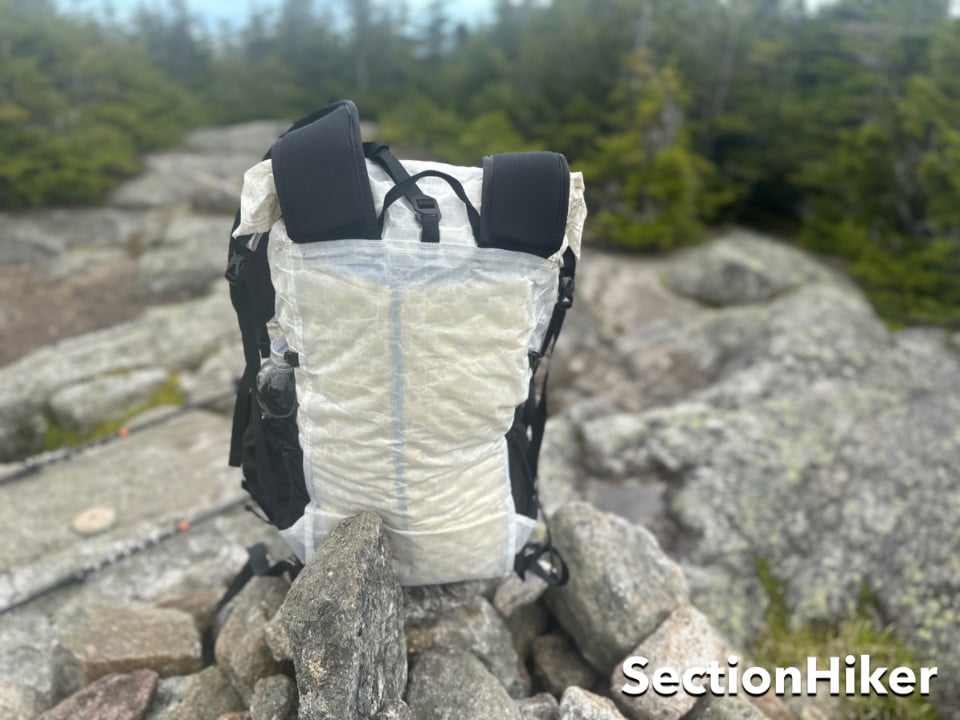
I deal with this by inserting a cut-down foam pad (Thermarest Z-lite Sol) inside the main pack bag behind the shoulder straps to cushion my back. Unfortunately, this takes up valuable interior space. A more efficient design approach is to include an external pad pocket like that on the Gossamer Gear Kumo 36 or external pad bungees as on the Zpacks Nero 38 since they don’t use any internal volume and can also be used as convenient sit pads.
The Contour 35 hipbelt is a simple webbing strap that keeps the backpack close to your torso, particularly if you are fastpacking or scrambling. It is easily removable by unclipping it from its two anchor points on the sides of the pack; however, you could use it to hold a fanny pack at your waist for extra storage.
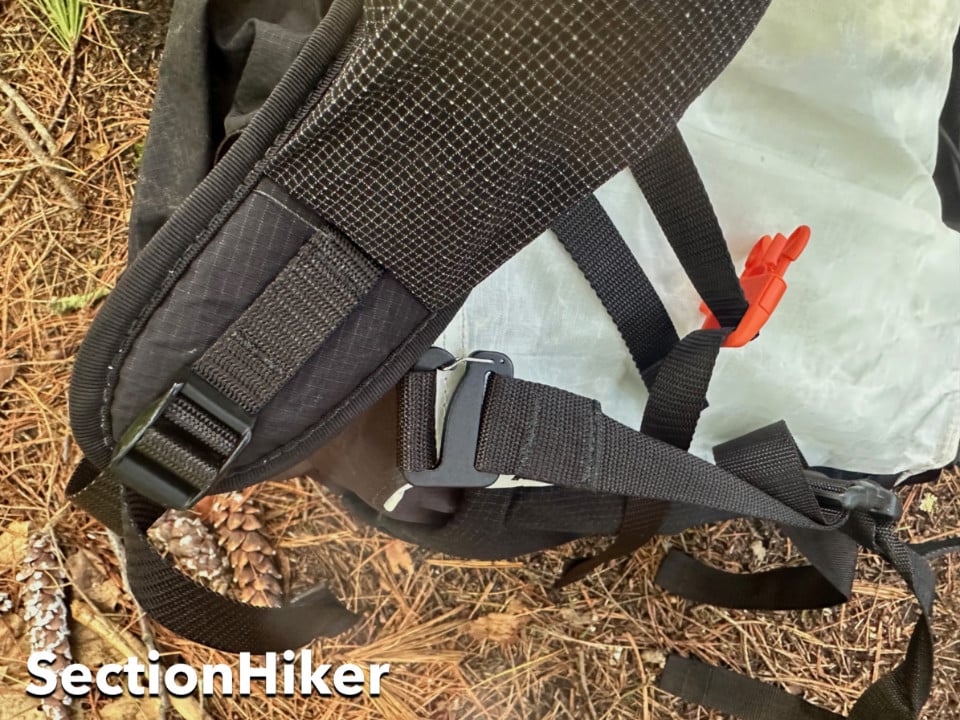
Attachment Points and Compression
The Contour 35 does not come with a Y-strap, making it more difficult to carry bulky gear, even a full foam pad, on top of the pack. I can’t fathom the reason for this omission when Hyperlight’s Waypoint 35, which is very similar to the Contour 35, includes one.
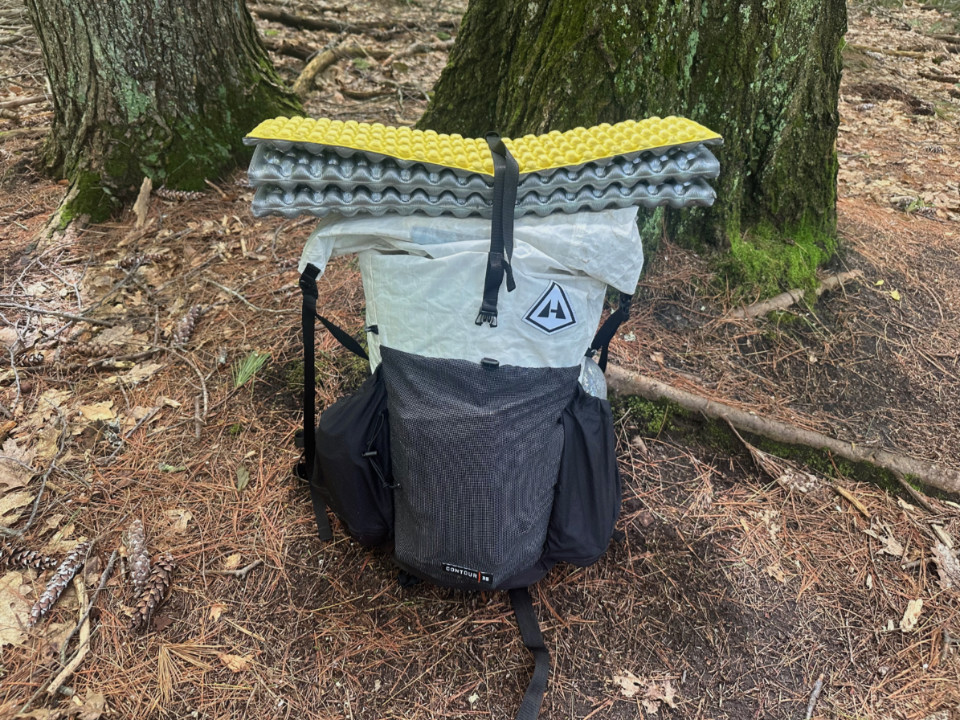
That single top strap also closes with a hook instead of a regular plastic buckle…and takes a surprising amount of dexterity to close. This is “good” because it discourages opening the main compartment during the day and forces more dependence on the external pockets. But that little hook is surprisingly difficult to see if you’re of an age where you need reading glasses to see things up close…an accessibility feature that the 20-somethings who designed the Contour 35 probably failed to consider. A plastic buckle would have been better, in addition to a Y-strap.
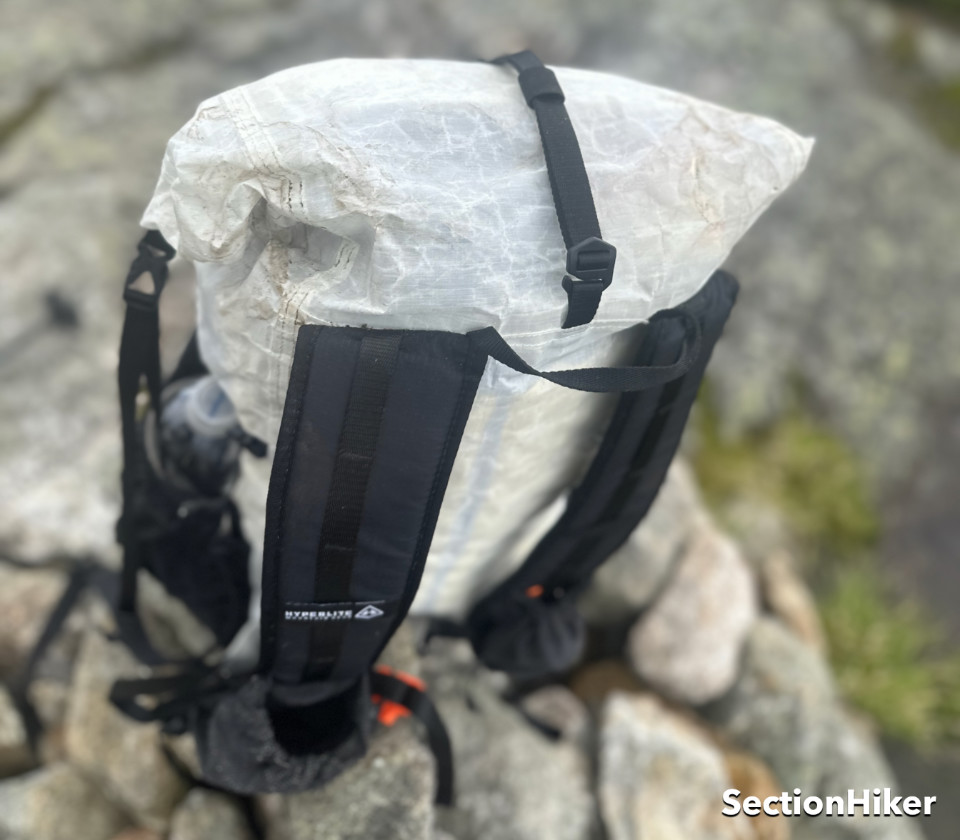
That said, there are a few other ways to lash gear to the outside of the Contour. In addition to an ice axe loop and a simple shaft holder, the side compression cords have line locs and buckles, making it easier to lash objects to the side of the pack even when wearing gloves. In addition, the side straps used to lash the roll top down can be connected over the front pocket, which can be handy if you want to lash a bulky foam pad there. Finally, there are six small webbing loops in the perimeter seams of the front mesh pocket that you could run cordage through and are useful for drying wet laundry.

Comparable Ultralight Frameless Backpacks
Recommendation
The Hyperlite Mountain Gear Contour 35 is a streamlined, frameless backpack made with Dyneema DCF that weighs 16.2 oz. Designed for thru-hikers with minimal kit, it’s loaded with external pockets so you can hike all day without having to stop and get items out of the main pack bag. While the Contour 35 is perfectly adequate for that task, it has a few quirks that make it somewhat less optimal when compared to other frameless ultralight backpacks. I think the pack would be a much stronger contender if it had vest-style shoulder straps to balance the load across the chest in addition to the shoulders, a top Y-strap, and an external pad sleeve or elastic cord to carry a pad on the pack’s exterior rather than using internal storage for that purpose. Check out our 10 Best Frameless Ultralight Backpack List for recommended alternatives. If storage space is less of a priority, the Contour 35 makes a nice day pack as long as you can get by using the external pockets and don’t need to access the main compartment very often.
I’d also recommend looking at the Hyperlite Mountain Gear Waypoint 35 (23.5 oz), which is quite similar to the Contour 35 but more versatile and a better value. It has a single (removable) frame stay, so it can comfortably carry 5-10 more pounds, a top Y-strap, and an optional hip belt with hip belt pockets.
Disclosure: Hyperlite Mtn Gear donated a backpack for review.
SectionHiker is reader-supported. We only make money if you purchase a product through our affiliate links. Help us continue to test and write unsponsored and independent gear reviews, beginner FAQs, and free hiking guides.
